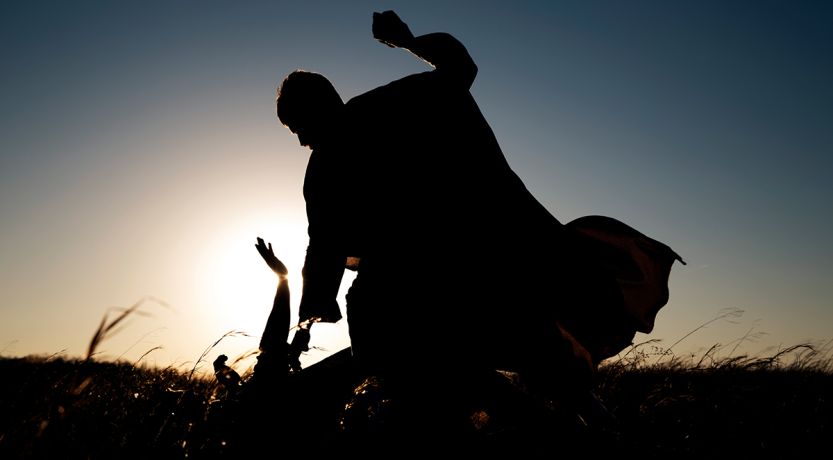Why study the first murder? The story of Cain and Abel sheds light on the trouble we have getting along, but God always has a few who reject the way of Cain.
The biblical account of the first humans is found in the first few chapters of Genesis. What we read there is merely a broad overview of mankind’s history. Since chapters 1-7 of this book summarize over 1,650 years of mankind’s history, there isn’t space for much detail.
But what is recorded for us in God’s Word regarding this period is extremely valuable.
The setting for Cain and Abel
Before we consider the significance of the story of Cain and Abel, let’s note the context. In Genesis 1-2 we read of God’s fashioning the earth for life and creating plants, sea creatures, birds, mammals and humans.
In Genesis 3 we learn that Satan, in the form of a serpent, deceived the first woman, Eve (see also Revelation 12:9). The serpent told Eve that she didn’t need to obey God and that she wouldn’t die, as God had said, if she ate of the forbidden tree. Instead, the serpent said, she would be like God and be able to decide for herself how to live.
The tree of the knowledge of good and evil
Satan’s argument was appealing. Eve and her husband, Adam, the first man, disobeyed God by eating of the tree of the knowledge of good and evil (Genesis 2:16-17; 3:1-6).
Eating of the forbidden tree represented Adam and Eve’s choosing to decide for themselves what was right or wrong, good or bad, appropriate or inappropriate, instead of looking to God for guidance. Their tragic decision has been followed by mankind ever since and has brought about severe consequences.
In addition to the fact that they were now under the death penalty for their sin of directly disobeying God’s command (Romans 6:23), Eve would experience pain and sorrow in motherhood, and Adam would have to work hard to get the ground to produce food (Genesis 3:16-19). Most significant, they were driven out of the garden and lost access to the tree of life, which represented the choice of obedience to God, which would ultimately lead to immortality (verses 22-24).
Genesis 4 documents the development of human civilization after Adam and Eve chose a lifestyle of deciding for themselves what was good and what was evil.
For a more detailed discussion of the two trees, see “The Tree of Life” and also the Daily Bible Verse Blog posts on Genesis 2:9 and Genesis 3:22-23.
The story of Cain and Abel is found in the following chapter. Genesis 4 documents the development of human civilization after Adam and Eve chose a lifestyle of deciding for themselves what was good and what was evil.
The births of Cain and Abel
Cain was the first human to be born. It was a time of joy and wonder. After bearing Cain, Eve exclaimed, “I have acquired a man from the LORD” (Genesis 4:1).
Then Eve bore another son who was named Abel (verse 2). Some scholars say the Hebrew text indicates the boys were twins.
Cain murders Abel
As Adam and Eve’s boys grew up, Cain became a farmer, and Abel became a herdsman. In time they both gave God an offering. They each gave to God from their chosen occupations. Cain gave produce from the ground, and Abel gave a firstborn animal from his flock of sheep (Genesis 4:2-4).
Then we read that God respected Abel’s offering, but not Cain’s (verse 5). The Bible doesn’t explain exactly why, but in any case, Cain thought God’s response to him was unfair. Cain saw himself as a victim, not the recipient of a response he had earned. Instead of being humbled by God’s reaction and determining to change his ways, Cain got angry.
God advised him to control his emotions (verses 5-6), but Cain allowed his anger and jealousy to get the better of him.
Ironically, the freedom Cain thought he would have by rejecting God’s guidance made him a slave to his misguided emotions and led him to murder his brother. New Testament writers refer to this as being in “bondage” to sin (Romans 8:15; Galatians 4:3; 2 Peter 2:19).
The first murder
Why did Cain commit such an awful and vile act—the malicious murder of his own brother? John explains that it was “because his [Cain’s] works were evil and his brother’s righteous” (1 John 3:12; compare Hebrews 11:4).
God was not pleased with Cain because of Cain’s lifestyle. Jude referred to Cain’s thinking and way of life as simply “the way of Cain” (Jude 1:11).
This way of Cain, with its faulty thought patterns and deeds, continues today. It is the reason for today’s conflicts between people and nations. People feel mistreated and disrespected and react in anger. And, sadly, in far too many cases people truly have been mistreated by others.
An ongoing lesson from this story is that distrust of God and acceptance of Satan’s encouragement to reject God often leads to distrusting and disrespecting others.
My brother’s keeper
After Cain murdered his brother, God asked him where his brother was. Cain’s well-known response was, “I do not know. Am I my brother’s keeper?” (Genesis 4:9).
Of course, Cain lied. He surely knew where his dead brother was.
Scripture makes it abundantly clear that we are to love and respect all of our fellow humans. Jesus distilled the 10 Commandments into two great commandments: love God and love our neighbor (Mark 12:29-31). Based on this instruction, we understand that we are indeed our brother’s keeper.
So how are we as Christians to respond when we are mistreated or feel mistreated? In such circumstances, we need to remember that God told Cain that he was responsible for his actions. God told him to rule over—resist—the negative emotions he was feeling so he would not sin (Genesis 4:6-7).
People and nations need to heed this advice today. We need to examine ourselves to see if our ways are right before God. If we have sinned, we need to repent. If we have not sinned, we still need to respect others. When we love God by obeying His good and beneficial laws, we find peace and are better able to love our fellow man.
Sadly, few respond as God advises, and our world is filled with anger, divisions, jealousies, murders and wars. The highly polarized anger reflected in politics, extremist groups and between nations today exists because people have followed the way of Cain.
Fruit from the forbidden tree
After ignoring God’s instructions and killing his brother, Cain suffered consequences. The ground was cursed; his occupation as a farmer was made much more difficult. Furthermore, he was to live the remainder of his days as a fugitive and a vagabond (verses 11-12).
Cain then whined to God that his punishment was unfair and that he feared being killed by others. In response, God set a mark on Cain to keep others from killing him (verse 15). Even so, Cain apparently lived the rest of his life in fear of being murdered.
Good and evil
When humans reject God’s instruction, they symbolically choose to eat the fruit from “the tree of the knowledge of good and evil” (Genesis 2:17). While this is a choice that leads to death instead of life (Proverbs 14:12), some good can also come from this choice because it represents both good and evil.
Some of the fruit that came from Cain’s descendants included the development of music and the ability to smelt and forge bronze and iron—things that can be used for good or for evil (Genesis 4:21-22). The bad fruit that Cain’s descendants produced and experienced included polygamy and the insecurity of living in a world filled with violence, wickedness and evil (verses 19, 23-24; Genesis 6:5).
Life apart from God and in opposition to His instructions brings severe penalties.
The way of Cain vs. the way of righteousness
Another issue often overlooked in the early chapters of Genesis is that mankind separated into two ways of life. Just as many chose the way of Cain, a few chose God’s way of life.
Abel’s way of life was righteous (1 John 3:12). After Abel’s death, Eve bore another son and named him Seth. Eve said, “For God has appointed another seed for me instead of Abel, whom Cain killed” (Genesis 4:25).
The scriptural indications are that at least some of Seth’s descendants strove to follow Abel’s example of living a righteous life. Both Enoch and Noah “walked with God” (Genesis 5:24; 6:9).
But the vast majority followed the way of Cain, and God decided the downward spiral had to be stopped. God spared Noah and his family, thus preserving the human race from the Flood. God saved a minority—the few who were striving to live the way of righteousness.
Jesus said that an elect few will also be instrumental in saving the end-time generation from total destruction (Matthew 24:22, 37).
The story of Cain and Abel still has relevance for us. God continues to respect the minority of people today who strive to live the way of righteousness.
The annual observance of Pentecost commemorates the beginning of the Church of God, which Jesus called the elect and a little flock (Acts 2:37-47; Luke 12:32). These themes remind us of this principle of God’s honoring the few who strive to live like Abel, Enoch and Noah.
The two different ways of life chosen by Cain and Abel still exist—the way of Cain and the way of righteousness. Which way will you choose?






